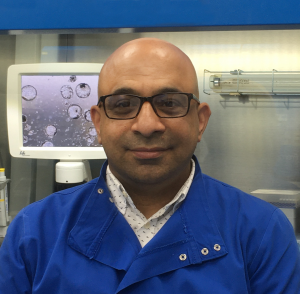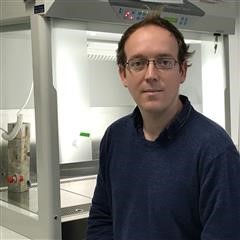In this Regenerative Medicine TIN interview as part of the Early Career Innovators series, recognising the amazing translational work being done by postdoc and non-tenured researchers within the UCL Therapeutic Innovation Networks (TINs), Dr Hassan Rashidi highlights his Regenerative Medicine TIN Pilot Data Fund awarded project, involving human stem cell-derived 3D hepatospheres (3D Heps) for liver diseases.
What is the title of your project and what does it involve?
The project’s title is “Dissecting the cross-talk between parenchymal and non-parenchymal derivatives within human pluripotent stem cell-derived 3D hepatospheres (3D Heps) using spatial transcriptomics”.
Previously, I developed a novel xeno-free protocol to generate 3D liver organoids suitable for clinical applications. I also formulated a new culture medium to stabilise the phenotype and function of 3D Heps for over a year in culture. In this project, I will use spatial transcriptomics to dissect the crosstalk between various populations of cells within the 3D Heps.
What is the motivation behind your project/therapeutic?
Liver diseases are leading causes of morbidity and mortality worldwide, accounting for about 1–2 million deaths annually. To date, orthotopic liver transplantation is the only curative option for treatment of individuals with inherited liver disorders, end-stage liver disease and acute liver failure. However, donor organ shortage, allogeneic rejection and adverse effects associated with long-term immunosuppressant medication are major limitations.
Human pluripotent stem cells (hPSCs) represent an attractive alternative source of hepatocytes, courtesy of their unlimited self-renewal capacity and potential to differentiate to all cell types found in the human body. Recently I developed a novel platform to generate 3D liver organoids exhibiting metabolic functionality for over a year in culture. In addition, therapeutic benefit of 3D Heps was demonstrated in a mouse model of inherited liver disease.
In the current project, I will perform spatial transcriptomic to gain a better understanding of the 3D Heps. In return, transcriptomic data will be used to further improve the platform to generate hepatocytes with superior functionalities and at scale for clinical applications.
Can you highlight any challenges have you experienced as an early career researcher in the regenerative medicine/translational research space?
While being fortunate to secure funding from several charities including Rosetrees Trust, Children’s Liver Disease Foundation, Sparks and Great Ormond Street Hospital Charity, a major challenge is the limited number of funding for early career researchers since most funding calls only accept applications from established academics. This is more problematic when it comes to translational research as larger amount of funding is required. Lack of stability is another issue as an extended timeframe is expected for fruition of translational projects.
Why did you want to apply to the Regenerative Medicine TIN Pilot Data Fund?
Funding calls such as the Regenerative Medicine TIN Pilot Data Fund are the ideal source of funding for the early career researchers to generate the preliminary data required for larger grant applications such as fellowships. In addition, Blue-sky thinking is encouraged in schemes like the Regenerative Medicine TIN Pilot Data Fund, making it possible to test high-risk, high-gain projects that are typically deemed to be too adventurous.
Join the community and subscribe to the TINs newsletter to keep updated on when the next TIN funding calls open
How did you find the process for the TIN Pilot Data Fund?
The process was straightforward as the application form was short with a quick announcement of shortlisted candidates. In addition, ACCELERATE training was offered following the announcement to prepare shortlisted candidates for the Dragon Den-style interview, which I benefited from immensely. I also participated in the ACCELERATE-CASMI Mentoring workshop, which was very helpful.
What do you hope to achieve in the 6 months duration of your project?
The data from spatial transcriptomics will provide crucial insight to further improve the 3D Heps platform. Within the project’s duration, I will complete RNA sequencing of the libraries generated from liver organoids at various stages of differentiation. I will use the preliminary data to apply for additional funding to improve the platform and to develop new technologies to benefit from tremendous potential of 3D Heps for in vitro and in vivo applications.
Dr Hassan Rashidi

Dr Hassan Rashidi is a Senior Research Associate at UCL Institute of Child Health. Dr Rashidi’s academic career has been driven by a strong interest in stem cell biology and the development of new technologies to harness the tremendous potential of human pluripotent stem cells for clinical and industrial applications.
His current focus is on development of in vitro and in vivo platforms to evaluate liver toxicity and treat liver disease, respectively.
 Close
Close




